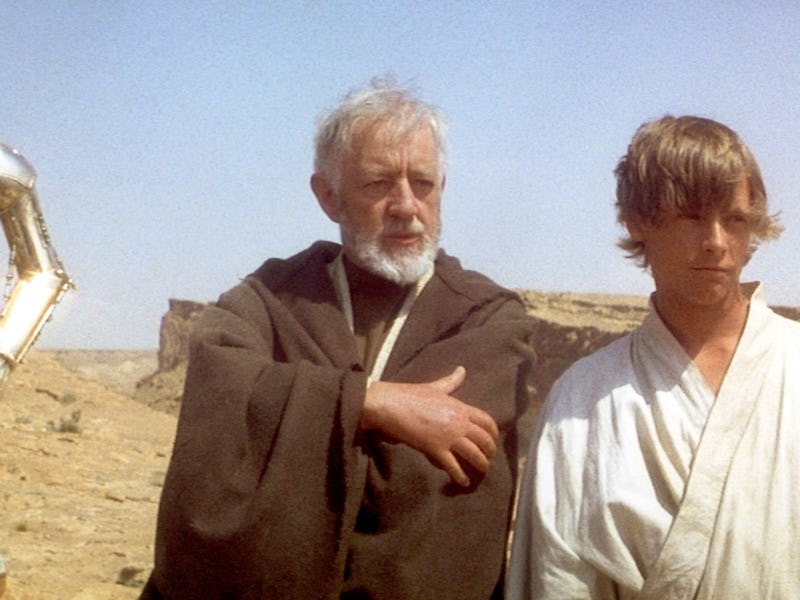45 years ago, a last-minute Star Wars change unlocked the greatest Jedi power
Without Marcia Lucas, her husband George might have kept Kenobi alive forever.

George Lucas didn’t invent Force ghosts. In fact, midway through filming the original Star Wars in 1976, Lucas hadn’t even considered that a Jedi might survive beyond their physical bodies. His then-wife, film editor Marcia Lucas, suggested the idea that Obi-Wan Kenobi becomes a spirit guide to Luke Skywalker very late in production. Here’s how a new documentary series unpacks this retro Star Wars bombshell.
On VICE TV, a new six-part documentary series called Icons Unearthed produced by Brian Volk-Weiss dives into the making of Star Wars. Although Marcia Lucas is not the sole focus of the Star Wars series on Icons Unearthed, this docu-series does boast the first on-camera interview with her all about Star Wars ... ever. (Most official documentaries and behind-the-scenes extras barely even mention her.) And in the first episode — which premiered on July 12 — Marcia Lucas makes it clear that this major plot pivot in Star Wars: A New Hope was very much her idea.
What if Obi-Wan had lived?
Alec Guinness with George Lucas before it was decided Obi-Wan would die.
The notion that Obi-Wan Kenobi didn’t die in early drafts of George Lucas’ screenplay for Star Wars isn’t new. Several non-fiction books — like Skywalking by Dale Pollock or Secrets of the Force by Ed Gross and Mark A. Altman — make it clear that the decision to kill off Obi-Wan Kenobi happened while the crew was still filming. In the shooting script, Ben fled to Yavin IV on the Falcon and then guided Luke via comlink from the Rebel Base.
Essentially, Ben’s role in both versions was functionally identical. He was either a disembodied voice on the radio or a disembodied voice from the spirit world.
Marcia Lucas created Force Ghosts
Vader and Obi-Wan’s final battle.
But in the new documentary, Marcia Lucas reveals that it was her idea to have Obi-Wan die at Darth Vader’s hands.
“I said, ‘What if Darth Vader kills Obi-Wan Kenobi?’” she recalls. “And Obi-Wan Kenobi disintegrates while they’re escaping, and George said, ‘I like that idea.’”
Marcia Lucas goes on to unpack the elegance of this concept, how nothing in the third act related to Obi-Wan had to change, but it established a foundation in Star Wars lore that has become so crucial today.
“In the script, Obi-Wan was in the Rebel War Room talking to Luke,” she says. “But I said, ‘He can still say all that stuff he needs to say to Luke.’ I sort of pride myself on killing Obi-Wan Kenobi!”
“I sort of pride myself on killing Obi-Wan Kenobi!”
The idea that Obi-Wan would “disintegrate” and become a ghost helps to contextualize the cosmic mysteries of the Force, but it’s also been an important mechanic to the ongoing saga time and time again. Yoda’s long-term plans rely entirely on Jedi communicating from beyond the grave, culminating in his conversation with Luke in The Last Jedi. Obi-Wan communicated with Luke throughout the original trilogy, appearing to him in Return of the Jedi’s final moments alongside Yoda and Anakin. The ending to the entire Skywalker Saga in The Rise of Skywalker also relies on the existence of Force Ghosts.
This throwaway suggestion wound up being an idea that remains hugely important almost half a century later. If the appearance of Qui-Gon Jinn as a Force Ghost in the final scenes of Obi-Wan Kenobi is any indication, then that’ll remain the case for the foreseeable future.
In order for the Jedi to live on — and become more powerful than we could possibly imagine — Obi-Wan had to die. And for that masterful move, we have Marcia Lucas to thank.
Icons Unearthed: Star Wars airs on VICE TV.
This article was originally published on